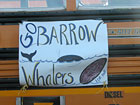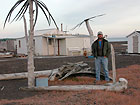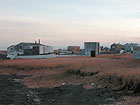

 | |||||||||||||||||||
|
|
Journals 2006/2007Kirk Beckendorf
September 2, 2006 It was suppose to turn windy so we did not go out on the boat today, but instead went to a football game. This afternoon the Barrow Whalers played the Sitka Wolves in Barrow's third football game EVER. Since Barrow High School has never had a football team they also don't have a football stadium. A dirt area at BASC was temporarily fenced off and flour was used to mark the yard lines. There are not many places where you can watch a football game with sea ice floating past.
The highlight of the day was dinner. We were invited over to one of the local's home. Robert is a biologist for the Department of Wildlife and Leslie is the high school biology teacher. A couple of other biologist, Craig and Geoff, and their wives joined us. Many interesting conversations flowed throughout the evening. Craig and Geoff had just returned from a 10-day moose hunt so there was much discussion about their trip, rafting down to the coast from the Brooks Range. Geoff's wife grew up in Barrow. She had many stories to tell of early life in the area. His grandparents, nomadic reindeer herders, raised Marie's father. He spent his childhood following the herds across northern Alaska. When she was a girl there were few if any cars in Barrow so they would travel by dog team. Her grandparents lived year round at PigNiq, (also called the Shooting Station). PigNiq is a sliver of land between the Beaufort Sea and Elson Lagoon, only a few hundred yards wide. There were no roads then so to get there they would launch a boat in Barrow and travel up the coast to PigNiq, which still has no running water or electricity. To get freshwater they would bury a wooden barrel in the sand. Freshwater would seep through the sides of the barrel and collect inside. Her's and other families would spend all summer there. Now PigNiq looks like a city of duck blinds on the beach. Families still go there to camp out and hunt ducks. It even has "palm trees" made from baleen.
Later in the evening Robert pulled out a box full of skulls, which he has collected over the years. We had a guessing game to see who could identify the skulls. Everything from bears and walrus, to a bat, seals, a prehistoric horse skull and a prehistoric short-faced bear skull he found here in northern Alaska. Concerns about oil exploration in the Chukchi Sea and on the tundra became apparent throughout the evening. Miles from nowhere, tracks of oil field equipment crisscrossing the tundra are seen. One person expressed dismay of when he was out in the vastness of the tundra miles from the nearest road; he came upon a large amount of oil exploration equipment. The discussions switched to airplane stories, not uncommon in the wilds of Alaska. Geoff told us of the two plane crashes he had survived. He ran into the top of a mountain and another time he ran out of gas at 10,000 feet. Steve talked about a flight when the pilot couldn't find the runway because of a snowstorm. He radioed ahead and the runway was lined with snowmobiles with their lights on so the pilot could find it. Still as the pilot was landing he realized they were coming in perpendicular to the runway and had to pull up at the last minute. Eventually they made a safe landing. Question of the Day: How would your life be different if there were no roads going to your town and the nearest city was 500 miles away? |
||||||||||||||||||



